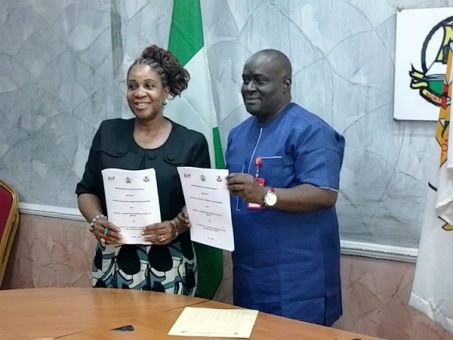By Franca Ofili
The Medical Laboratory Science Council of Nigeria (MLSCN) and the National Malaria Elimination Programme (NMEP) have signed a Memorandum of Understanding (MoU) to combat malaria and strengthen diagnostic capacity.
The Registrar of the council, Prof. Tosan Erhabor, made this known in Abuja on Monday when the two bodies signed the accord.
He said that the MoU signified a major step forward in the shared mission to combat malaria and strengthen diagnostic capacity across the country.
He added that “today, we are not just signing a document, we are formalising a partnership that speaks to the very heart of public health — collaboration, innovation, and capacity building.
“This MoU provides the framework for establishing a Training Laboratory for Malaria Microscopy at the MLSCN Public Health Laboratory in Abuja, using forty-two (42) state-of-the-art teaching microscopes generously provided by NMEP under the Global Fund Grant Cycle 7 (GC-7).
“This initiative is a testament to what can be achieved when institutions align their strengths.
“While NMEP brings national coordination, resources and focus on malaria elimination, MLSCN will provide regulatory oversight, technical expertise and commitment to maintaining high standards in laboratory diagnostics.”
The registrar said that together, the two bodies would lay the groundwork for sustainable training platform that would empower laboratory scientists with the skills needed for accurate malaria diagnosis.
“As we sign this agreement, I wish to assure you that MLSCN is fully committed to upholding responsibilities under this MoU,” he added.
In her speech, Mrs Nnenna Ogrulafor, the National Coordinator of NMEP, said
malaria remained one of the leading public health challenges in Nigeria.
Ogrulafor said that malaria is not only the source of increase in morbidity and mortality in the country, but also hindering economic progress and development.
According to her, recent rates, particularly in vulnerability statistics, reveal that the country is still grappling with high prevalence rates, especially among children and pregnant women.
“It is, therefore, imperative that we strengthen our capacities, enhance diagnostic capabilities and later innovation in our approach to malaria prevention.
“The establishment of a dedicated malaria training laboratory is part of our intervention strategies.
“The laboratory will serve as a hub for training for the private and public sector and research toward equipping healthcare professionals with the knowledge and skills necessary to implement effective malaria diagnostic methodologies.
“By investing in human capital and technical expertise, we are laying the groundwork for sustainable malaria elimination efforts,” she stressed.
According to her, the partnership will facilitate the development of standardised laboratory protocols, promote quality assurance in malaria diagnostics and enhance overall reliability of laboratory services. (NAN)(www.nannews.ng)
Edited by Hadiza Mohammed-Aliyu












